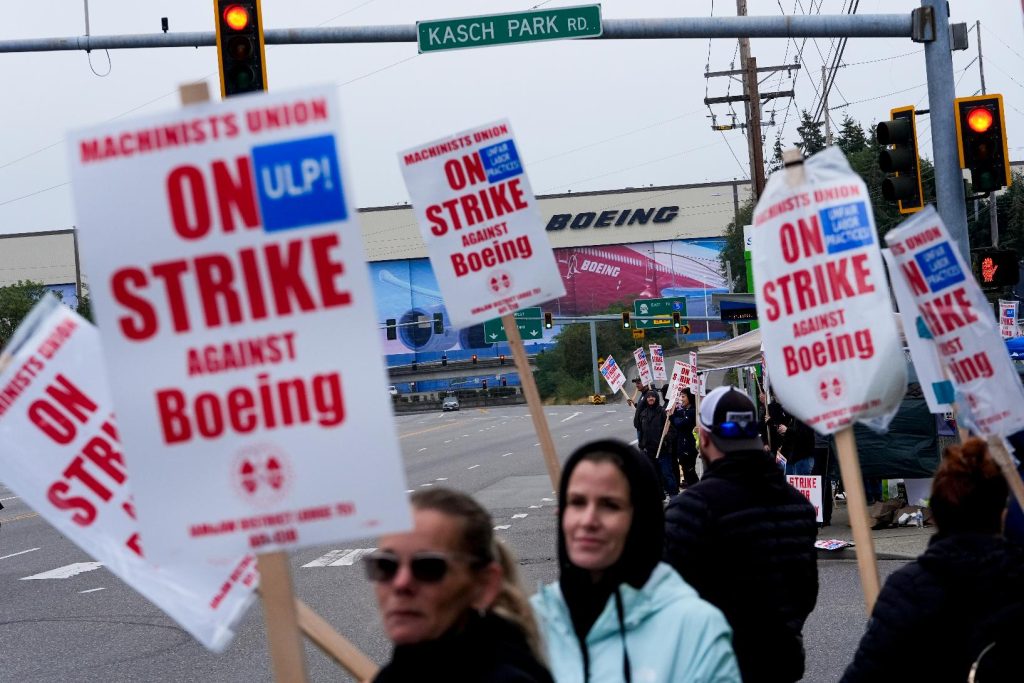Boeing Workers Union Rejects Company’s ‘Final’ 30% Pay Offer
3 min read

The union representing thousands of striking Boeing workers has expressed strong discontent with the company’s recent proposal, which it labeled as its “best and final” offer. This offer includes a 30% pay increase over four years, along with the reinstatement of performance bonuses and enhanced retirement benefits. However, the International Association of Machinists and Aerospace Workers (IAM) claims that Boeing did not negotiate this proposal with them, stating that it was presented without any prior discussions.
More than 30,000 Boeing employees went on strike earlier this month after rejecting a previous offer that included a 25% pay rise. In a letter to workers, Boeing indicated that it developed this new proposal in response to employee concerns. The company noted that it had doubled the amount of a one-time signing bonus from $3,000 to $6,000 (£4,497).
Boeing’s proposal is contingent on ratification by union members by midnight Pacific Time on September 27 (7 AM GMT on September 28). In a surprising move, IAM accused Boeing of directly communicating the offer to union members and the media without involving union representatives. “This tactic is a blatant show of disrespect to you—our members—and the bargaining process,” the union stated in a post on X (formerly known as Twitter).
IAM has made it clear that it will not conduct a vote among its members before Boeing’s deadline, further complicating the situation. Boeing, in response, defended its actions, telling the BBC that it had engaged in good faith negotiations with IAM since formal talks began in March. “We first presented the offer to the union and then transparently shared the details with our employees,” the company added.
The backdrop to this tension dates back to September 13, when Boeing workers voted to strike after turning down an initial contract proposal that included a 25% pay increase over four years. The union initially aimed for a more ambitious 40% pay increase, but nearly 95% of its members voted against Boeing’s first offer, with 96% endorsing strike action until a satisfactory agreement could be achieved.
The ongoing strike poses significant financial risks to Boeing, potentially costing the company billions. Boeing is already facing numerous challenges, and the impact of the strike has rippled through the industry and the broader U.S. economy. In response to the walkout, Boeing has halted shipments of most parts and implemented measures to cut costs. The company has also suspended the jobs of tens of thousands of employees and has instituted a furlough policy, requiring U.S.-based executives and staff to take one week of unpaid leave every four weeks for the duration of the strike.
Amid these escalating tensions, government officials have stepped in to mediate discussions between Boeing and the IAM. The stakes are high, as both sides seek to reach a resolution that addresses worker concerns while allowing Boeing to regain stability in its operations.
As the deadline approaches, the situation remains fluid. IAM’s members are closely monitoring the developments, weighing their options as they consider their next steps in response to Boeing’s proposals and tactics. The resolution of this dispute could not only affect the workers involved but also have significant implications for Boeing’s future, especially as it navigates a challenging economic landscape and strives to maintain its position as a leader in the aerospace industry.
The outcome of these negotiations will likely set a precedent for labor relations within the aerospace sector, influencing how companies address worker grievances and negotiate contracts in the future. As the strike continues, both Boeing and the IAM are under pressure to find common ground that can lead to a mutually beneficial resolution.